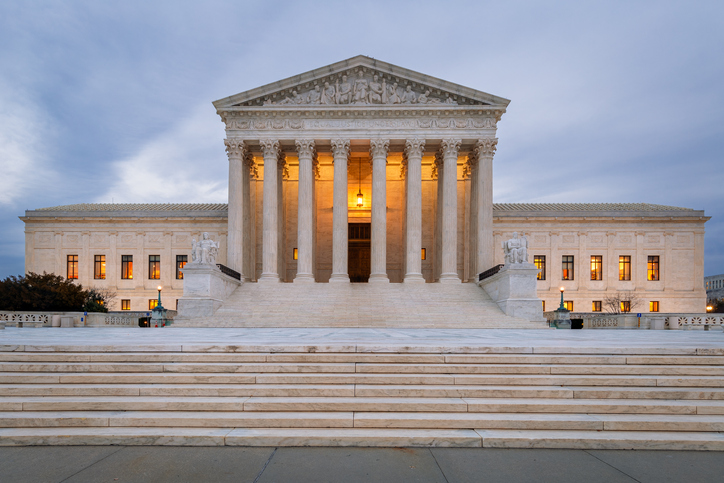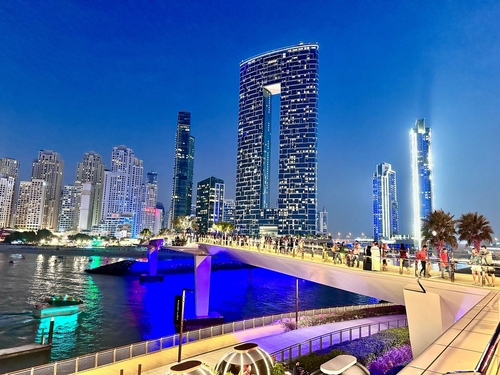Google Case Heads to Supreme Court With Powerful Internet Shield Law at Stake
Company’s defence against liability in 2015 Paris terrorist attack invokes ‘Magna Carta of the internet’
WASHINGTON—Google goes before the U.S. Supreme Court this week to defend what is widely regarded as a pillar of the online economy—and one that is also being blamed for a proliferation of harmful content.
The law at issue, known as Section 230, gives internet platforms legal immunity for almost all third-party content hosted on their sites. A decision to limit that immunity could scramble the business models of the internet’s biggest companies—especially social media platforms such as Instagram, TikTok and Google’s YouTube that rely heavily on recommendation algorithms.
“Unless they reaffirm the status quo, they’re going to cause a huge disruption,” said Alan Rozenshtein, a University of Minnesota law professor, at a Brookings Institution panel discussion about the case last week, where he described Section 230 as “the Magna Carta of the internet.”
There is widespread support in Congress for overhauling Section 230, but legislative efforts to do so have stalled amid partisan disagreements over the diagnosis and the cure.
Lawmakers in both parties worry that the immunity law has helped spread promotion of harmful content to vulnerable groups such as children. Democrats also say the immunity has allowed companies to ignore false and dangerous information spreading online, while Republicans say it has enabled liberal-leaning tech companies to block conservative viewpoints.
That has put the Supreme Court in position to potentially rewrite a legal cornerstone of the internet. The case, Gonzalez v. Google, was brought by the family of an American college student, Nohemi Gonzalez, who was among more than 100 people killed during the 2015 Paris terrorist attacks.
The plaintiffs allege that YouTube failed to take down some ISIS terrorist videos and even recommended them to users. They say that makes Google liable for damages under the Anti-Terrorism Act, although they haven’t presented evidence that the terrorists involved saw those videos. In essence, the plaintiffs and their allies argue that Section 230 protection shouldn’t apply to platforms’ algorithmic recommendations of harmful content.
Google, a unit of Alphabet Inc., prevailed in lower courts by arguing that it is protected by Section 230 of the 1996 Communications Decency Act. The law is often known as a shield because it prevents platforms from being sued for hosting harmful user posts, a measure that has been credited with paving the way for internet platforms to prosper economically.
Section 230 also shields platforms from suits for blocking objectionable content. Lawmakers at the time hoped this would encourage internet companies to block harmful content such as sexual images of children, but detractors say tech platforms have used it to censor conservative viewpoints.
Groups supporting the plaintiffs, including some child-safety advocates and conservative free-speech proponents, say the case is a long-overdue chance to right a fundamental legal imbalance that has given the online platforms an unhealthy amount of power and influence.
They say the internet ecosystem has become a breeding ground for a range of social ills, from hate speech to eating disorders, largely because of the 1996 immunity shield for online platforms.
In friend-of-the-court briefs, several allies of the plaintiffs focused on the potential harms done to children online by algorithmic recommendation systems that aim to maximize minors’ engagement.
“We’ve all woken up 20 years later and the internet’s not great,” said Hany Farid, a computer science professor at the University of California, Berkeley, at the recent Brookings panel. “And maybe it’s time to start thinking about how to make the internet a more civilised place.”
But the prospect that Section 230 could be scaled back by the high court has caused a wave of worry in the internet industry.
Companies and others filing friend-of-the-court briefs in support of Google include Meta Platforms Inc., owner of Instagram and Facebook, and NetChoice, a trade group that includes TikTok, which is owned by China’s ByteDance Ltd.
Microsoft Corp. also took Google’s side, saying that platforms “inevitably will have to dramatically cut down on the content they allow on their services—even content they have no reason to believe falls afoul of any law.”
A number of conservative pro-business groups have sided with Google, along with the American Civil Liberties Union and the Progressive Policy Institute.
Limiting Section 230 would stifle the internet’s creative ferment by making platforms wary about recommending personalised content—the technology that has made platforms such as TikTok and Instagram so popular, said Jeff Kosseff, author of “The Twenty Six Words That Created the Internet,” a book about the Section 230 immunity law.
Also filing a brief in support of Section 230 were the sponsors of Section 230, Sen. Ron Wyden (D., Ore.) and former Rep. Christopher Cox (R., Calif.).
A ruling against Google “would subject platforms to liability for all of their decisions to present or not present particular third-party content—the very actions that Congress intended to protect,” the two wrote.
But in a worrisome development for internet companies, the Biden administration argues that expansive readings of the federal immunity law threaten to erode other legal protections.
“An overly broad reading of [the immunity law] would undermine the enforcement of other important federal statutes by both private plaintiffs and federal agencies,” the U.S. Solicitor General wrote in a friend-of-the-court brief.
The Supreme Court decided last fall to hear the case. Many legal scholars believe that Justice Clarence Thomas likely led the push to review the Gonzalez case, since he had previously suggested in court statements and opinions that the federal courts’ current interpretation of Section 230 could be too broad.
The case is scheduled for oral arguments before the court Tuesday, with a decision expected by the end of the high court’s term in late June or early July.
Some scholars believe that the justices could yet stop short of deciding the Gonzalez case. That is because the plaintiffs’ underlying claims under the Anti-Terrorism Act could be rejected by the justices in a similar case, Twitter Inc. v. Taamneh, which is set for arguments Wednesday.
The Twitter case was brought by family members of Nawras Alassaf, who was killed in an ISIS attack at an Istanbul nightclub in 2017. Mr. Alassaf’s relatives allege that Twitter, Google and Meta provided material support to ISIS and are “the vehicle of choice in spreading propaganda.”
Lawyers for Twitter, Google and Facebook have said in court filings that they have made extensive efforts to remove ISIS content and that there is no direct causal link between the websites and the Paris and Istanbul attacks.
 Copyright 2020, Dow Jones & Company, Inc. All Rights Reserved Worldwide. LEARN MORE
Copyright 2020, Dow Jones & Company, Inc. All Rights Reserved Worldwide. LEARN MORE
This stylish family home combines a classic palette and finishes with a flexible floorplan
Just 55 minutes from Sydney, make this your creative getaway located in the majestic Hawkesbury region.
As Paris makes its final preparations for the Olympic games, its residents are busy with their own—packing their suitcases, confirming their reservations, and getting out of town.
Worried about the hordes of crowds and overall chaos the Olympics could bring, Parisians are fleeing the city in droves and inundating resort cities around the country. Hotels and holiday rentals in some of France’s most popular vacation destinations—from the French Riviera in the south to the beaches of Normandy in the north—say they are expecting massive crowds this year in advance of the Olympics. The games will run from July 26-Aug. 1.
“It’s already a major holiday season for us, and beyond that, we have the Olympics,” says Stéphane Personeni, general manager of the Lily of the Valley hotel in Saint Tropez. “People began booking early this year.”
Personeni’s hotel typically has no issues filling its rooms each summer—by May of each year, the luxury hotel typically finds itself completely booked out for the months of July and August. But this year, the 53-room hotel began filling up for summer reservations in February.
“We told our regular guests that everything—hotels, apartments, villas—are going to be hard to find this summer,” Personeni says. His neighbours around Saint Tropez say they’re similarly booked up.
As of March, the online marketplace Gens de Confiance (“Trusted People”), saw a 50% increase in reservations from Parisians seeking vacation rentals outside the capital during the Olympics.
Already, August is a popular vacation time for the French. With a minimum of five weeks of vacation mandated by law, many decide to take the entire month off, renting out villas in beachside destinations for longer periods.
But beyond the typical August travel, the Olympics are having a real impact, says Bertille Marchal, a spokesperson for Gens de Confiance.
“We’ve seen nearly three times more reservations for the dates of the Olympics than the following two weeks,” Marchal says. “The increase is definitely linked to the Olympic Games.”

Getty Images
According to the site, the most sought-out vacation destinations are Morbihan and Loire-Atlantique, a seaside region in the northwest; le Var, a coastal area within the southeast of France along the Côte d’Azur; and the island of Corsica in the Mediterranean.
Meanwhile, the Olympics haven’t necessarily been a boon to foreign tourism in the country. Many tourists who might have otherwise come to France are avoiding it this year in favour of other European capitals. In Paris, demand for stays at high-end hotels has collapsed, with bookings down 50% in July compared to last year, according to UMIH Prestige, which represents hotels charging at least €800 ($865) a night for rooms.
Earlier this year, high-end restaurants and concierges said the Olympics might even be an opportunity to score a hard-get-seat at the city’s fine dining.
In the Occitanie region in southwest France, the overall number of reservations this summer hasn’t changed much from last year, says Vincent Gare, president of the regional tourism committee there.
“But looking further at the numbers, we do see an increase in the clientele coming from the Paris region,” Gare told Le Figaro, noting that the increase in reservations has fallen directly on the dates of the Olympic games.
Michel Barré, a retiree living in Paris’s Le Marais neighbourhood, is one of those opting for the beach rather than the opening ceremony. In January, he booked a stay in Normandy for two weeks.
“Even though it’s a major European capital, Paris is still a small city—it’s a massive effort to host all of these events,” Barré says. “The Olympics are going to be a mess.”
More than anything, he just wants some calm after an event-filled summer in Paris, which just before the Olympics experienced the drama of a snap election called by Macron.
“It’s been a hectic summer here,” he says.

AFP via Getty Images
Parisians—Barré included—feel that the city, by over-catering to its tourists, is driving out many residents.
Parts of the Seine—usually one of the most popular summertime hangout spots —have been closed off for weeks as the city installs bleachers and Olympics signage. In certain neighbourhoods, residents will need to scan a QR code with police to access their own apartments. And from the Olympics to Sept. 8, Paris is nearly doubling the price of transit tickets from €2.15 to €4 per ride.
The city’s clear willingness to capitalise on its tourists has motivated some residents to do the same. In March, the number of active Airbnb listings in Paris reached an all-time high as hosts rushed to list their apartments. Listings grew 40% from the same time last year, according to the company.
With their regular clients taking off, Parisian restaurants and merchants are complaining that business is down.
“Are there any Parisians left in Paris?” Alaine Fontaine, president of the restaurant industry association, told the radio station Franceinfo on Sunday. “For the last three weeks, there haven’t been any here.”
Still, for all the talk of those leaving, there are plenty who have decided to stick around.
Jay Swanson, an American expat and YouTuber, can’t imagine leaving during the Olympics—he secured his tickets to see ping pong and volleyball last year. He’s also less concerned about the crowds and road closures than others, having just put together a series of videos explaining how to navigate Paris during the games.
“It’s been 100 years since the Games came to Paris; when else will we get a chance to host the world like this?” Swanson says. “So many Parisians are leaving and tourism is down, so not only will it be quiet but the only people left will be here for a party.”
This stylish family home combines a classic palette and finishes with a flexible floorplan
Just 55 minutes from Sydney, make this your creative getaway located in the majestic Hawkesbury region.






















